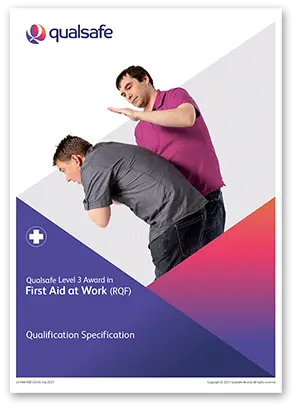The Qualsafe Level 3 Award in First Aid at Work (RQF) is designed to provide learners with the skills, knowledge, and confidence to respond to a wide range of workplace emergencies. Over the course of three days, learners will cover the following key topics:
Day 1: Introduction and Basic First Aid
• Role and Responsibilities of a First Aider: Understanding the legal duties of a first aider, and their role within the workplace. This includes communication, record-keeping, and maintaining safety at the scene.
• Assessing an Incident: Learners will be taught how to assess an emergency situation, ensuring their safety and the safety of others around them. The initial steps to take when responding to an emergency will be covered.
• Managing an Unresponsive Casualty: How to recognise when a casualty is unresponsive and the correct procedure for checking responsiveness and breathing. Practical skills will be developed in managing the recovery position and airway maintenance.
• CPR (Cardiopulmonary Resuscitation): How to perform high-quality CPR for adults, including chest compressions and rescue breaths, using the correct ratio. CPR techniques will be practised on mannequins to ensure learners feel confident in real-life situations.
• Dealing with Choking: Learners will understand how to identify and manage choking in adults, including the use of back slaps and abdominal thrusts.
Day 2: Dealing with Medical Emergencies and Injuries
• Heart Attacks: How to identify the signs of a heart attack, including chest pain and discomfort, and how to provide initial care until emergency services arrive.
• Severe Bleeding and Shock Management: How to manage external bleeding, including the use of bandages, dressings, and pressure techniques. Learners will also be taught how to manage shock by maintaining the casualty’s body temperature and positioning.
• Burns and Scalds: First aid for burns and scalds, including assessing the severity and cooling the burn to reduce tissue damage. The use of dressings will also be covered.
• Fractures and Sprains: Learners will be shown how to recognise and treat fractures, sprains, and soft tissue injuries. This includes immobilisation techniques using splints and bandages.
• Head, Neck, and Spinal Injuries: How to manage suspected spinal and head injuries safely, including the correct way to move a casualty and how to prevent further injury.
Day 3: Specific Medical Conditions and Assessment
• Seizures and Stroke: Learners will learn how to recognise and respond to a seizure or stroke. The signs of a stroke will be highlighted, and learners will understand how to act quickly to provide immediate care.
• Diabetic Emergencies: Identifying signs of a diabetic emergency, including hypoglycaemia and hyperglycaemia, and how to manage the condition with the correct first aid treatment.
• Anaphylaxis: Recognising the signs of severe allergic reactions, including anaphylactic shock, and how to treat the casualty using adrenaline auto-injectors (e.g., EpiPen).
• Asthma Attacks: How to identify and manage an asthma attack, including the correct use of inhalers and supporting the casualty while awaiting further medical assistance.
• Record Keeping and Reporting: The importance of documenting the incident, including the details of the casualty, the care provided, and the actions taken. This ensures compliance with workplace health and safety regulations.
Practical Assessment and Certification
• Practical Scenarios: Throughout the course, learners will take part in practical scenarios to reinforce their learning and develop confidence in using first aid techniques. They will demonstrate their competence in CPR, managing a casualty, and dealing with medical conditions and injuries.
• Theory and Practical Assessment: Learners will be continuously assessed on both their theoretical knowledge and practical skills. A final assessment will take place at the end of the course to ensure learners are fully competent to perform first aid in a workplace setting.
• Certification: Upon successful completion of the course, learners will receive the Qualsafe Level 3 Award in First Aid at Work (RQF) certificate, which is valid for three years. The certificate demonstrates that the learner is a qualified first aider, equipped to handle a wide range of emergency situations in the workplace.
By the end of the course, learners will be confident in their ability to provide effective first aid and respond to emergencies in a calm and competent manner. The practical skills and theoretical knowledge gained from this course ensure that workplaces are equipped with qualified personnel to manage medical emergencies and promote a safer environment for all employees.








%20Transparent.png)


